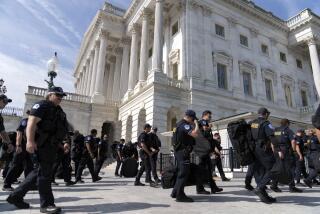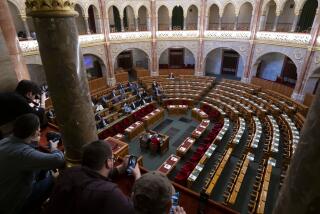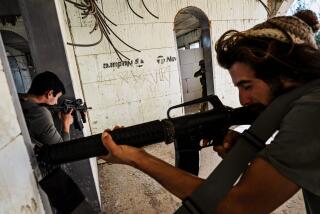Israel Lawmakers Bow to Army, Give Up Sit-in on West Bank
- Share via
JERUSALEM — Right-wing Israeli members of Parliament early today peacefully gave up their protest sit-in at an apartment in predominantly Arab Hebron on the occupied West Bank but vowed to appeal the military order evicting them to the Supreme Court.
Four of the lawmakers began their demonstration last Thursday in an effort to force the national unity coalition government to revive the stalled Jewish settlement drive in areas captured by Israel after the 1967 Six-Day War. They also sought to undermine the latest U.S. effort to broker a Mideast peace agreement.
Three other members of Parliament had since joined the sit-in, so there were seven who finally evacuated the run-down, second-floor apartment in a narrow alley of the crowded Hebron casbah at about 3:30 a.m.
Defense Minister Yitzhak Rabin on Monday had ordered them to leave under terms of a 1979 government decision that the defense minister must approve any new property purchase by Jews in West Bank areas densely populated by Arabs. The order was delivered to the members of Parliament just before midnight Monday by the Israeli military governor of Hebron.
The Parliament members consulted with leaders of the Jewish settlement movement before voluntarily leaving the apartment under army escort. The army immediately sealed the apartment and posted guards outside the entrance.
“They may have evacuated us from the apartment, but they have not evacuated us from the struggle for the Jewish section of Hebron,” declared Geula Cohen, a Parliament member from the pro-settlement Tehiya (Renaissance) party who was one of the original squatters. Cohen called the army action “a joy for our enemies and a joy for those among us who played into their hands.”
The lawmakers said they will demand before the Supreme Court that Rabin show cause why Jews are not allowed to buy property in Hebron.
Hebron, burial place of the patriarch Abraham, is considered holy by both Arabs and Jews, but it became an entirely Arab city after a bloody massacre of Jewish residents in 1929. Militant Jewish settlers returned to the area soon after it was captured from Jordan in the 1967 war, vowing to re-establish a Jewish presence.
There are currently 28 Jewish families living in four enclaves within the heart of the city.
More to Read
Sign up for Essential California
The most important California stories and recommendations in your inbox every morning.
You may occasionally receive promotional content from the Los Angeles Times.










